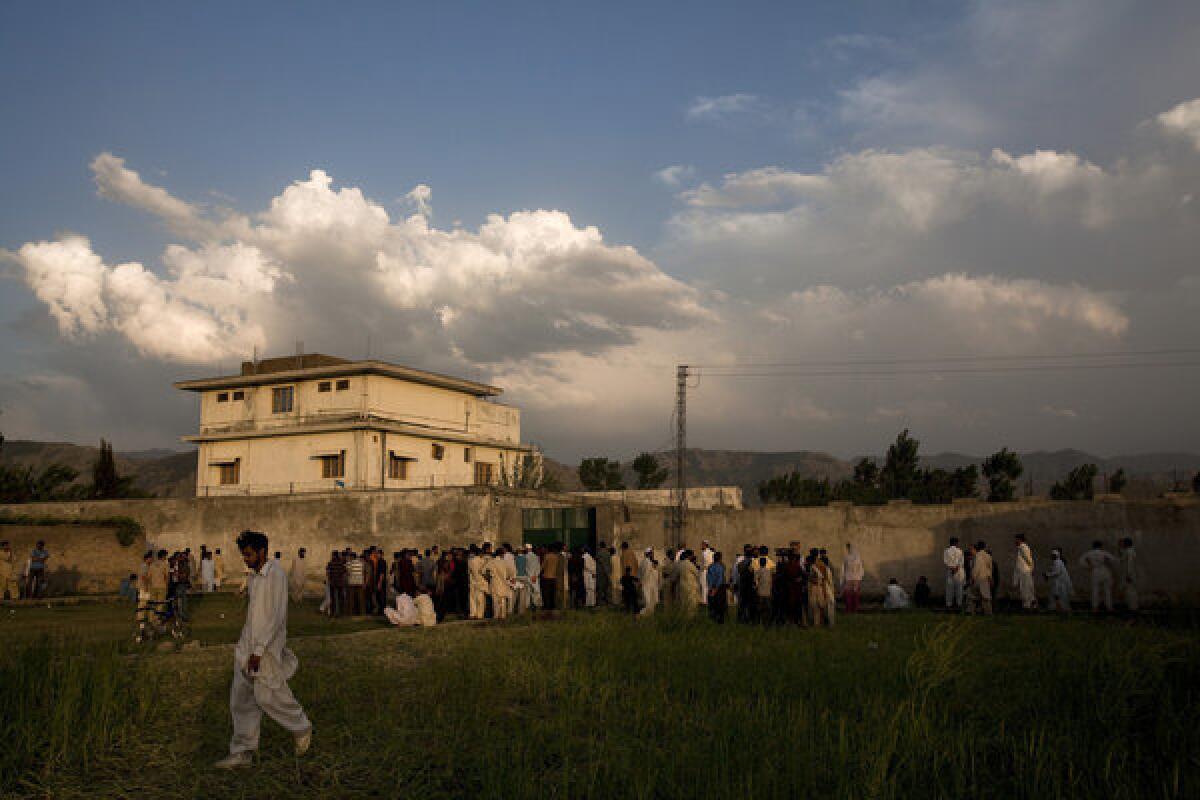Leaked Pakistan report faults government for failing to find Bin Laden

ISLAMABAD, Pakistan -- Incompetence by Pakistanâs spy agencies and civilian government allowed Osama bin Laden to hide in the country for nine years before he was killed by U.S. commandos, a Pakistani investigative commission has concluded, though it added it did not have enough evidence to assert government complicity in the Al Qaeda leaderâs presence in the South Asian nation.
The commission was established following Bin Ladenâs death in May 2011, when many Pakistanis demanded to know how the Al Qaeda leader was able to evade detection in the country for so long, and were deeply angered by the ease with which Navy SEALs in stealth helicopters slipped in and out of Pakistan to carry out the covert raid against Bin Laden without any reaction from the military.
The report was finished several months ago, but the government kept delaying its release. A copy was leaked to the Qatar-based Al Jazeera television network, which posted it on its website late Monday.
Looking back: Full coverage of bin Ladenâs death
The U.S. mission to kill Bin Laden at his compound in the military city of Abbottabad was one of a series of events in 2011 that pushed increasingly tenuous relations between the U.S. and Pakistan to the brink of collapse. In January 2011, a CIA contractor shot and killed two Pakistani men in the eastern city of Lahore. Six months after Bin Ladenâs death, U.S. aircraft mistakenly killed 24 Pakistani soldiers along the Afghan-Pakistani border.
It was the Bin Laden raid, however, that did the most damage to two of the countryâs most powerful institutions -- the military and the intelligence community.
A week after the raid, Lt. Gen. Ahmed Shuja Pasha, head of Pakistanâs premier spy agency, Inter-Services Intelligence, or ISI, appeared before parliament and offered to resign, acknowledging the Pakistani security establishmentâs inability to detect the incoming U.S. helicopters as well as the Al Qaeda leaderâs use of Abbottabad as a hideout. Lawmakers allowed him to keep his post.
The report was particularly harsh in its criticism of the military and intelligence community, both of which historically have been seen in Pakistani society as unassailable.
Made up of a Supreme Court judge, a career diplomat, a former police official and a retired army general, the commission pointed out that intelligence and law enforcement agencies were unable to track down Bin Laden in Abbottabad, even though he and his family lived there for nearly six years in a sprawling compound that should have caught their attention. The building was surrounded by 18-foot walls topped with barbed wire, and it had no telephone, cable TV or garbage collection service.
âNone of this served to attract any notice from our intelligence, security and military personnel for almost six years,â the report stated. âBut it took the CIA almost no time to conclude that the house was probably a hideout for a [high value target].â
To avoid detection, bin Laden and his family never left the compound, instead relying on two Pakistani brothers who acted as security guards, bought food and paid bills. The commission concluded that Bin Laden also must have gotten help from other Pakistanis, some of whom âmay not have been so loyal or dedicated. ... An effective intelligence agency should have been able to contact, infiltrate or co-opt them, and to develop a whole case load of information. Apparently that was not the case.â
Bin Laden lived in at least four locations in Pakistan -- the tribal areas along the border with Afghanistan, the Swat Valley and the northwest cities of Peshawar and Haripur -- before moving into the Abbottabad compound in 2005, the report said.
The commission stopped short of confirming suspicions held by some officials and lawmakers in Washington that current or former Pakistani intelligence officials must have known about Bin Ladenâs presence in Pakistan, and perhaps even helped him hide. However, it also did not discount that possibility.
âGiven the length of stay and the changes of residence of [Bin Laden] and his family in Pakistan ... the possibility of some direct or indirect and âplausibly deniableâ support cannot be ruled out,â the report stated.
The commission was not granted any binding authority, and it remains to be seen whether the countryâs new government, led by Prime Minister Nawaz Sharif, will act on its recommendations, including a call for ramped-up scrutiny of the countryâs intelligence community.
None of Pakistanâs intelligence agencies, the commission stated, âhas ever been subjected to proper accountability procedures. It is a law of nature that under such circumstances, institutions degenerate and progressively lose competence. This has happened in Pakistan. This will need to be addressed if the political leadership can summon the will to do so.â
ALSO:
Car bomb targeting convoy kills 15 in Pakistan
Bolshoi Theater director fired after decade of turmoil
Egyptâs Muslim Brotherhood rejects timetable for elections
More to Read
Sign up for Essential California
The most important California stories and recommendations in your inbox every morning.
You may occasionally receive promotional content from the Los Angeles Times.










